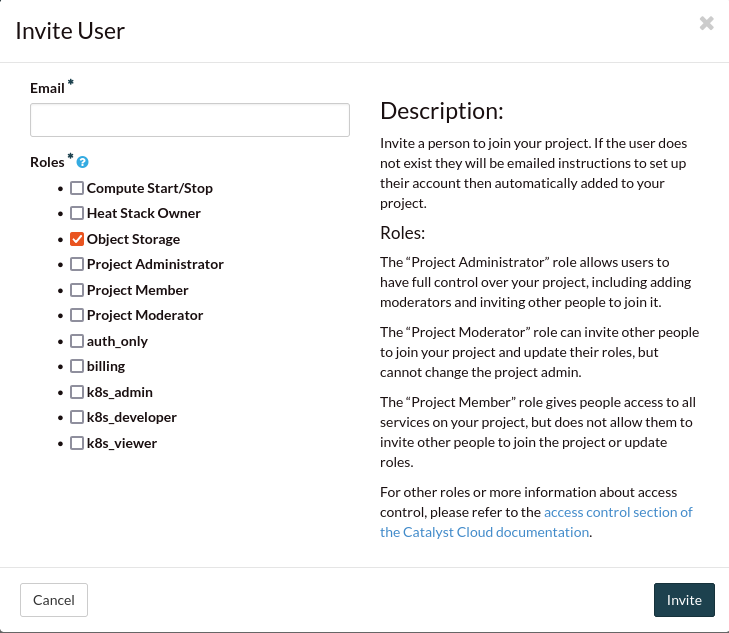Automating backup tasks with cron
In order to make this process more useful, we could automate our backup tasks
by creating a cronjob to run backups on a regular basis, by means
of a shell script.
It is also best practice to create a separate backup user account in your cloud
project that is only given rights to access object storage. The main
justification for this is that in order to have scripts run commands unattended
it is necessary to embed plaintext password information in the scripts.
Creating the backup user
To create a new user account, go to Management -> Project Users in the left
hand menu of the dashboard, then click on the +Invite User button.
Fill in the Invite User form as shown, making sure the only Role selected is
Object Storage.

Once you receive the invite, complete the sign-in process as
the new user. There should now be a new user with Object Storage as their only
available role.

You can then download a copy of the backup user’s OpenStack RC file: see
Source an openstack RC file, which will provide the credential information for the
following section.
Creating the backup scripts
Now we can create our backup process. This will consist of:
Here is the basic script to manage the running of a Duplicity backup.
Typically, this would be placed somewhere like /usr/local/bin.
#!/bin/bash
# Source SWIFT access variables required by duplicity
source /etc/duplicity/duplicity-vars.sh
BACKUP_DEFINITIONS_DIR="/etc/duplicity/backup_sources.d"
BACKUP_CONFIG="${1}"
if [ -z "${BACKUP_CONFIG}" ]; then
BACKUP_CONFIG='*'
fi
# Run backups defined in BACKUP_DEFINITIONS_DIR or only the one specified as $1
# The BACKUP_* variables need NOT to be double-quoted for the shell name expansion to work
for BACKUP_DEFINITION_FILE in ${BACKUP_DEFINITIONS_DIR}/${BACKUP_CONFIG}.conf
do
# Make sure we don't have any leftover variables set before next loop run
unset SRC
unset DEST
unset PRE_BACKUP_CMD
unset POST_BACKUP_CMD
unset DUPLICITY_BACKUP_RETENTION
unset DUPLICITY_BACKUP_CYCLE
unset DUPLICITY_VOLSIZE
unset DUPLICITY_NUM_RETRIES
# Source variables used on each loop run
if [ ! -f "${BACKUP_DEFINITION_FILE}" ]; then
INFO="No backups defined in ${BACKUP_DEFINITIONS_DIR}/ or ${BACKUP_DEFINITION_FILE} is not a file"
echo $INFO
continue
fi
# Source the main config file again as we overwrite some variables in backup definitions
source /etc/duplicity/duplicity.vars
source "${BACKUP_DEFINITION_FILE}"
# Check if the src and dest backup vars are not empty
if [ ! -z "${SRC}" ] && [ ! -z "${DEST}" ]; then
# Run defined tasks before doing the backup
if [ ! -z "${PRE_BACKUP_CMD}" ]; then
eval "${PRE_BACKUP_CMD}"
rc=$?
if [ ${rc} -gt 0 ]
then
# Error handling
INFO="Pre backup command failed with rc = ${rc}"
echo $INFO
continue
fi
fi
# Run backup
duplicity --verbosity Notice \
--full-if-older-than ${DUPLICITY_BACKUP_CYCLE} \
--num-retries ${DUPLICITY_NUM_RETRIES} \
--asynchronous-upload \
--no-encryption \
--volsize ${DUPLICITY_VOLSIZE} \
"${SRC}" "${DEST}"
rc=$?
if [ ${rc} -gt 0 ]
then
# Error handling
INFO="Backup failed with rc = ${rc}"
echo $INFO
continue
fi
# Duplicity cleanups
duplicity remove-older-than ${DUPLICITY_BACKUP_RETENTION} --verbosity notice --force "${DEST}"
rc=$?
if [ ${rc} -gt 0 ]
then
# Error handling
INFO="Deleting old backups failed with rc = ${rc}"
echo $INFO
continue
fi
# Duplicity collection status summary
duplicity collection-status "${DEST}"
rc=$?
if [ ${rc} -gt 0 ]
then
# Error handling
INFO="Collection status failed with rc = ${rc}"
echo $INFO
continue
fi
# Run a command after doing the backup
if [ ! -z "${POST_BACKUP_CMD}" ]; then
eval "${POST_BACKUP_CMD}"
rc=$?
if [ ${rc} -gt 0 ]
then
# Error handling
INFO="Post backup command failed with rc = ${rc}"
echo $INFO
continue
fi
fi
else
INFO="No backup source or destination defined in ${BACKUP_DEFINITION_FILE}"
echo $INFO
continue
fi
# If the script managed to reach this point all backup steps succeeded so we can report that to icinga
INFO="Backup succeeded"
echo $INFO
done
This script defines the control parameters such as retention and frequency for
the backup tasks as well as providing authentication information for object
storage. The previous script is expecting to find this in
/etc/duplicity/duplicity-vars.sh.
#!/bin/bash
# Variables used by the backup script
# Duplicity specific variables
export DUPLICITY_BACKUP_CYCLE='7D' #7 days
export DUPLICITY_BACKUP_RETENTION='14D' #14 days
export DUPLICITY_VOLSIZE='512' #object chunk size in bytes
export DUPLICITY_NUM_RETRIES='3'
# Catalyst Cloud object storage credential information
export SWIFT_USERNAME='<your-backup-user>@<your-project-name>'
export SWIFT_REGIONNAME='nz_wlg_2'
export SWIFT_TENANTNAME='<your-project-name>'
export SWIFT_PASSWORD='<your-openrc-password>'
export SWIFT_AUTHURL='https://api.cloud.catalyst.net.nz:5000'
export SWIFT_AUTHVERSION='3'
export SWIFT_USER_DOMAIN_NAME="default"
export SWIFT_PROJECT_DOMAIN_NAME="default"
Then we need to define the backup definitions. Create a file with a name
relevant to the backup task in /etc/duplicity/backup_sources.d and add at
least the following two entries
SRC="/path/to/files/"
DEST="swift://<container-name>"
Depending on the nature of the thing you wish to back up, you may also need to
include pre-backup commands such as the one shown below. This is to ensure that
the data you wish to capture, in this case the contents of a gitlab repository,
have been written to disk prior to the backup task running.
PRE_BACKUP_CMD="CRON=1 /opt/gitlab/bin/gitlab-rake gitlab:backup:create"
Finally you’ll create a new file called duplicity-backup-cron
in /etc/cron.d/. This is the cron job that will be responsible for running the
backups. See (cron) for more information on this.
#
35 2 * * * root /usr/local/bin/duplicity-backup.sh >> /var/log/backup/duplicity.log 2>&1


